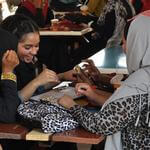Where reporting on victims of violence and abuse makes you a target: Journalism in Sudan
Many Sudanese women experience violence and threats. So do the female journalists who report on the abuses. Violence against women has traditionally been an issue that is not talked about in Sudan, but journalists, activists and researchers refuse to remain silent any longer.
The suburbs of Khartoum can be unwelcoming to the women who have fled there trying to escape conflict and violence in other parts of the country. In the early hours of the morning and dark of the night, they walk through areas with no electricity, no services and no security on their way to and home from work with the risk of being attacked, beaten up and raped, or being arrested by the police.
-Many of them are cleaners or maids. Their working hours force them to walk by themselves when the streets are empty and no one can protect them. This makes them vulnerable, says Lubna Abdullah Ibrahim Ahmed, a journalist reporting on violence against women for the El Jareeda daily newspaper.
In Sudan, walking alone at night makes you an unrespectable woman. Work between 10 p.m. to 6 is prohibited by law for women, with the exception of a few white collar jobs. But being able to adhere to the law is a privilege. The marginalized women of the suburbs do not have a choice. They need to work to feed their families. And they are met with little understanding. If they are not simply arrested by the police, they are vulnerable for assault. If they are assaulted, it is considered their own fault, simply for walking in the street at the wrong hours.
Putting herself at risk
The marginalised women in the suburbs in Khartoum have a special place in Lubna Abdullah Ibrahim Ahmed’s heart. She talks to them, records and reports their stories. When she writes about violence and abuses against women, she never mentions anyone by name – that would have made them even more vulnerable. Instead, there is only one name in the article. Her name is there in the newspaper black on white, for everyone to see. Reporting on violence against women in a conservative Islamist regime carries great risks for the journalists. High ranking politicians continue to claim that there is no violence against women in Sudan. Ahmed gets intimidating phone calls intended to silence her. She gets threats from the Sudanese security police, NISS, and she is by no means alone.
Last year, a report from the Sudanese Journalists for Human Rights (JHR) stated that 15 female journalists in Sudan had been harassed by the security police during the past year. Another five journalists had been subjected to judicial and legal procedures for their work, and three had been harassed by various state institutions. JHR claims that female journalists are being systematically targeted in Sudan, and that incidents that are reported are merely the tip of the iceberg.
A newly formed network has become an important support arena for Lubna Abdullah Ibrahim Ahmed and other female Sudanese journalists. The network emerged after a workshop on violence against women organized by the joint CMI/ Ahfad University for Women ARUS research project.
A network for safety and support
Violence against women has been a sensitive and silent issue in Sudan for a long time, but it is now being put on the agenda by women activists, journalists and researchers. Samia El Nager has tried to break the taboo for decades. El Nager is both researcher and activist, and has a central role in the ARUS project. She is the one who invited female journalists to a workshop on violence against women, building on research by the Sudanese and Norwegian researchers in the ARUS project.
Her first workshops on training and awareness raising on violence against women were for university staff only, placing gender and violence against women firmly on the research agenda. Then she expanded to parliamentarians, government employees, civil society organizations and journalists.
-I used the training component on gender and violence against women to conduct training for female journalists. During the workshop the journalists started talking about sexual harassment and abuse that they themselves had been subjected to, and how to protect themselves. That encouraged them to write even more about the hardships of the vulnerable women in the poor suburbs of Khartoum amongst others, says El Nager.
Will not be threatened into silence
The female journalists have now registered their network as a non-profit organization. The network has empowered them to continue to speak out against violence against women.
-Sharing experiences with other journalists in the same position makes us stronger and more confident. We can talk about difficulties and obstacles we encounter trying to get our news articles published, and about the threats we are subjected to, says Ahmed.
The network of female journalists do not have any funds, but organize meetings outside in the open or ask friends and acquaintances if they can borrow an office. They are determined to continue sharing their experiences, and to share the stories of the women who are victims of violence and abuse. Despite threats, they will not be intimated into silence.
By Åse Johanne Roti Dahl
Project
